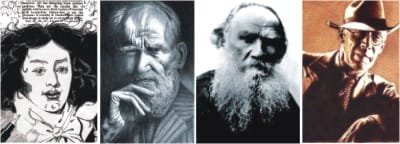Shakespeare's fans . . . and his detractors

L-R: Coleridge, Shaw, Tolstoy and Miller
"I believe the souls of 500 Sir Isaac Newtons would go to the making up of a Shakespeare. " Thus did Samuel Taylor Coleridge emphatically express his rating of the Bard of Avon. Other writers from time to time have felt too the compulsion to speak on him either slanderously or admiringly.
William Shakespeare is generally regarded as the greatest dramatist and poet of all time. His fame has caused many people to pass comments about him. We attempt here to discuss some of those comments made by his peers and fellow writers over the years. It is interesting to note that the comments are either optimistic or pessimistic. While some writers recognize him as the greatest poet and dramatist of all time, others denounce him with derisive epithets.
Shakespeare's envious contemporary Robert Greene, Master of Arts of both Oxford and Cambridge, who died in poverty, derided him for not having university education and described him as "an upstart Crow, beautified with our feathers" Ben Jonson said that Shakespeare had "small Latin and less Greek".
Shakespeare has faced unjust and cruel criticism from other great writers in all ages and does so even today. We rather begin to look at him through the comments made by some great authors who failed to appreciate the universality as well as the greatness of Shakespeare. Leo Tolstoy made a derogatory comment on Shakespeare's tragedies. He found Shakespeare "absurd, incomprehensible, and inartistic" and was amused at his tragic endings where "half a dozen corpses" would be "dragged out by the legs." Since he had read him in translation, he could not appreciate either high drama or fine poetry in Shakespeare.
Voltaire, a French philosopher and writer, utterly fails to comprehend Shakespeare. His invective goes, "Shakespeare is a drunken savage with some imagination whose plays can please only in London and Canada." Mark Twain was so disrespectful of Shakespeare that he warned his wife not to read Gulliver's Travels, Don Quixote or Shakespeare's plays, because they contained "grossness". He ridiculed Shakespeare's fans and coined the term "Shakesperoids" for those who adore him.
It is really incomprehensible why great authors like D.H. Lawrence, T.S. Eliot and George Bernard Shaw could not appreciate Shakespeare. Lawrence comments, "When I read Shakespeare I am struck with wonder that such trivial people should muse and thunder in such lovely language…And Hamlethow boring, how boring to live with so mean and self-conscious blowing and snoring."
George Bernard Shaw, himself a great dramatist, was bitterly critical of Shakespeare: "With the single exception of Homer, there is no eminent writer, not even Sir Walter Scott, whom I despise as entirely as I despise Shakespeare when I measure up my mind against his. It would be a positive relief to dig him up and throw stones at him". Shaw proclaimed that Shakespeare was "for an afternoon, but not for all time." He coined the term "bardolater" to describe the typical Shakespeare worshipper. T.S. Eliot stated that Hamlet was "certainly an artistic failure." Samuel Pepys failed to appreciate one of the greatest comedies, A Midsummer Night's Dream, and thought that it was " the most insipid ridiculous play that I ever saw in life".
Henry Miller makes a very interesting comment, "People simply do not read Shakespeare any more, nor the Bible either. They read 'about' Shakespeare. The critical literature that has built up about his name and works is vastly more fruitful and stimulating than Shakespeare himself." Robert Graves is no less amusing: "The remarkable thing about Shakespeare is that he really is very good, in spite of all the people who say he is very good."
It is really unpalatable for any reader to relish so many invectives from so many great writers. It can vex a Shakespeare fan. To breathe some cool air, we may look up some complimentary comments now. Samuel Johnson's appreciation is appropriate: "His drama is the mirror of life." John Keats drew his inspiration from him and used to keep a portrait of Shakespeare over his head as the God of imagination. He rightly said, "Shakespeare led a life of allegory; his works are the comments on it." Matthew Arnold goes on to say, "I keep saying Shakespeare, Shakespeare, you are as obscure as life is."
James Barrie, with reference to the age-worn debate whether Shakespeare had existed at all or Francis Bacon wrote all his plays, said, "I know not, sir, whether Bacon wrote the works of Shakespeare, but if he did not it seems to me that he missed the opportunity of his life".
Virginia Woolf holds that other writers need not attempt to write. "Even the less known plays are written at a speed that is quicker than anybody else's quickest…..Why then should anyone else attempt to write?" It is also pertinent here to see how Hazlitt evaluates Shakespeare: "To know the force of human genius we should read Shakespeare; to see the insignificance of human learning we may study his commentators."
To sum up, what is apparent, from the quite numerous contemporary down to current references about Shakespeare, is that he is a man of breadth one who has always been much envied, much admired, and much loved. Jonson suggested that "he was not of an age, but for all time"; and many others since then from other times and other cultures have agreed.

 For all latest news, follow The Daily Star's Google News channel.
For all latest news, follow The Daily Star's Google News channel. 



Comments